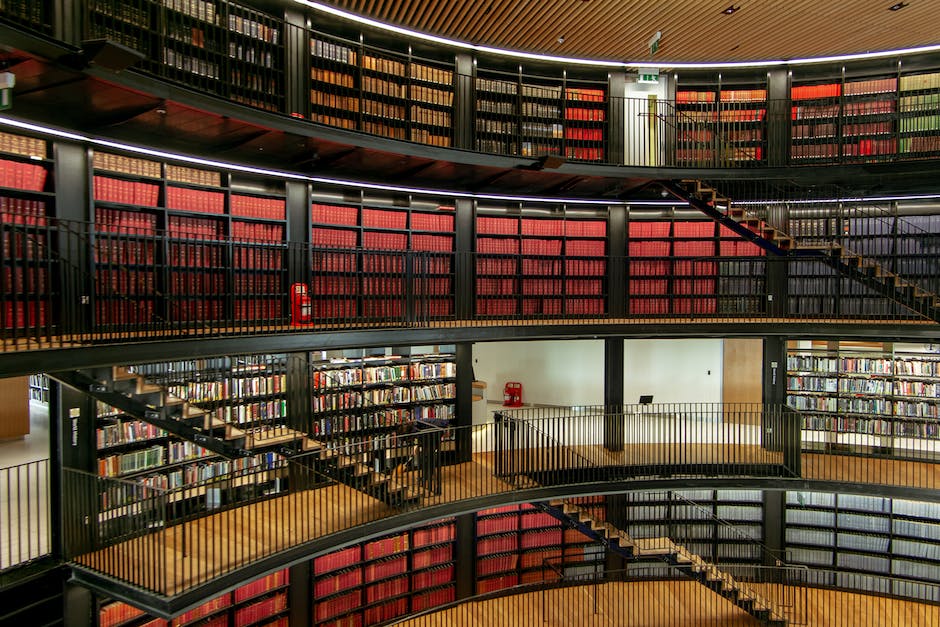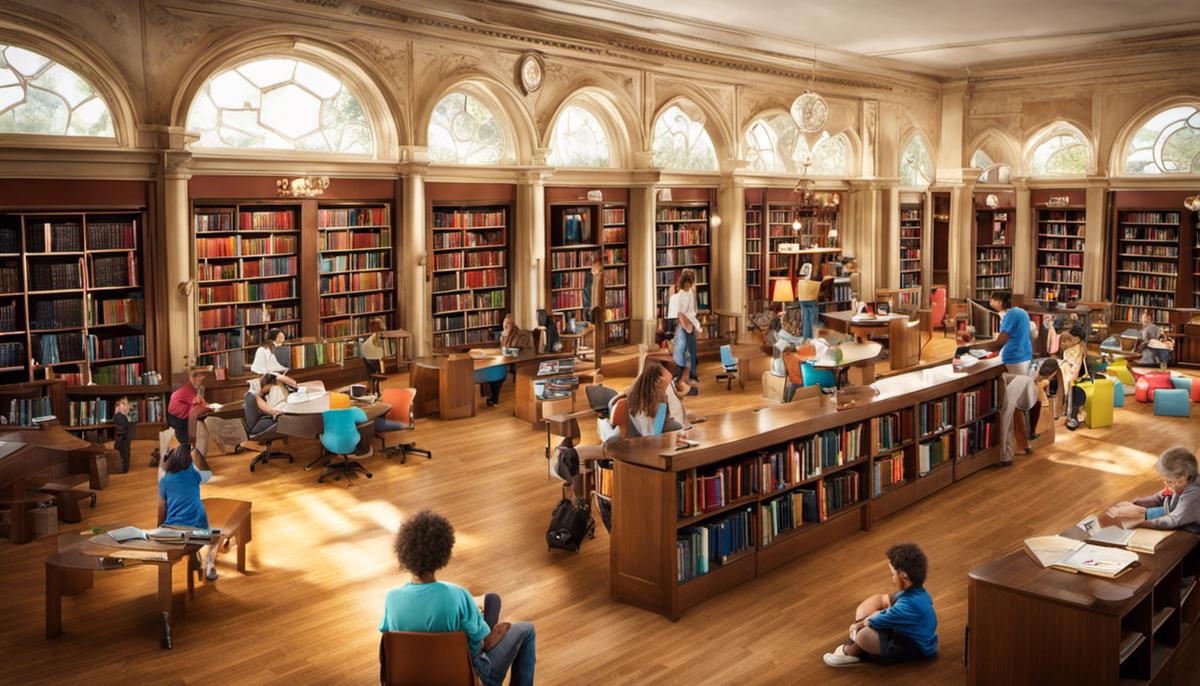The significance of public libraries extends well beyond their traditional role as a repository for books. Acting as a true center for knowledge, libraries provide invaluable services, tailored to accommodate the needs of the wider community. This essential institution is deeply rooted in the principles of progress and social equity, serving as a beacon of education and skill-building, a key player in digital inclusion, a hub for community interactions, a preserver and promoter of cultural diversity, and a cornerstone in promoting democracy and civil discourse. These multifaceted roles of public libraries narrate an inspiring story of enabling individuals and strengthening communities, a reminiscence that underlines its indispensable value in our society.
Table of Contents
Education and Skill Building
Public libraries, these vibrant reservoirs of varied knowledge, play an instrumental role in fostering education and skill development. They represent democratic hubs of learning, designed to foster intellectual thinking and knowledge acquisition, ultimately serving as pillars of community empowerment.
In contemporary society, the conventional picture of libraries brimming with dusty shelves of books is drastically evolving. They are currently delving into realms much broader and diversified than merely dispensing books. Libraries in the modern era are technologically empowered spaces, abounding in digital resources that serve as pragmatic tools for advanced learning, innovation, skill development, and workforce readiness.
Primarily, public libraries promote a culture of life-long learning. They provide access to diverse learning resources that cater to individuals across different ages and learning capacities. They possess rich collections of books, periodicals, and digital information across various disciplines, thus promoting education that goes beyond the traditional school syllabus.
One of the most pronounced effects of libraries on education is the promotion of literacy. Libraries provide individuals with a plethora of reading materials, thereby fostering reading habits, enhancing vocabulary, and promoting language skills. Research affirms that countries with higher library usage also demonstrate better literacy rates, illustrating the vital role libraries play in fostering literacy.
Moreover, public libraries are instrumental in bridging the digital divide. With computer workstations offering internet access, free Wi-Fi, and digital literacy classes, libraries enable individuals to learn and harness the power of technology. In a rapidly digitizing world, these skills can make a substantial difference, particularly for low-income populations that might not have access to such technologies otherwise.
Furthermore, libraries serve as democratic platforms for skill development. They offer a myriad of workshops, seminars, and training sessions on an array of subjects – from art and culture to entrepreneurship and coding. This versatility of skill development opportunities empowers individuals to broaden their horizons, thus promoting personal growth and employability.
In today’s digital age, libraries have indeed stepped beyond their conventional roles, actively challenging existing paradigms. Specifically, they play an intriguing role in supplementing formal education and vocational education. Libraries offer access to a broad spectrum of online learning resources including MOOCs, webinars, and vocational training materials. These tools not only enhance academic knowledge but also help in imparting modern vocational skills to the patrons.
The pivotal role of libraries in community education must also be noted. Libraries regularly organize events that encourage community participation, offering platforms for dialogues, debates, and discussions. Herein lies the contribution of libraries towards cultivating critical thinking, public speaking, and interpersonal skills among individuals.
Libraries also foster a positive environment for self-paced and self-directed learning. The quiet, conducive environment provided by libraries encourages individuals to explore their academic and creative pursuits at their own pace. Over time, this freedom fosters independent learning and critical thinking, attributes that lie at the heart of comprehensive education and skill development.
In essence, public libraries are powerhouses of knowledge fostering education and skill development in a multi-pronged manner. Through their resources and services, libraries unravel a world of possibilities to the curious mind, underscoring their importance in today’s education landscape.

Digital Inclusion
Despite the robust exploration of the role of public libraries in fostering lifelong learning, digital inclusion in community settings often remains an unexplored territory. Nevertheless, public libraries have made significant strides in ensuring the intersection of technology and community in a bid to foster digital inclusion.
Without a doubt, the provision of internet access has become one of the most critical roles played by libraries in promoting social equity. Public libraries often stand as the lone beacon of free and reliable internet access, particularly in marginalized and underserviced communities. By providing this essential service, libraries have opened up a portal for the community members to connect with the global digital community, access digital resources and services, and participate in the digital economy.
On another front, public libraries have gone beyond just providing internet access. They also strive to foster digital literacy – a 21st-century skill deemed critical for full participation in societal activities. Through structured training programs, libraries help community members gain competence in using electronic devices and associated software applications, equipping them with the ability to find, evaluate, and use digital information effectively.
Interestingly, public libraries have also spearheaded initiatives to challenge the notion that digital technology is exclusively a domain for the young. These libraries offer targeted digital literacy programs for seniors, hence assisting them in overcoming the fears and uncertainties that are often associated with digital technology.
Moreover, libraries have also scaled up their role as technology incubators. These public spaces have introduced Makerspaces – collaborative workspaces equipped with tools and technology such as 3D printers and electronics hardware. Here, enthusiastic learners of all ages can learn, explore, and create digital technology, thereby inspiring a new wave of digital innovators at a community level.
Finally, in a bid to keep pace with the ever-evolving digital landscape, libraries have introduced digital collections, including eBooks, eAudiobooks, digital magazines, and streaming video platforms. The digitalization of collection items not only enhances access to materials but also extends the library’s reach beyond its physical boundaries.
Through practical and innovative approaches, libraries have managed to position themselves as crucial partners in societal efforts to bolster digital inclusion. The criticality of this role is likely to increase in the foreseeable future, making public libraries an indispensable fixture in our community fabric.

Photo by cieloadentro on Unsplash
Community Connections and Social Integration
Social Integration through Public Libraries: Catalysts for Community Connections and Unity
Shaping collective consciousness, public libraries serve as the social glue keeping our communities connected. They are crucial conduits catalyzing social integration by transforming the fabric of community relations. Not merely repositories of books or information, libraries operate as active agents of social cohesion, fostering meaningful engagement and dialogue across diverse societal cross-sections.
Offering safe, accessible spaces for multicultural interactions, public libraries promote cultural understanding and mutual respect. They house myriad activities dedicated to multicultural learning – from language learning classes to hosting cultural events – paving the way for meaningful interactions across different ethnicities, outlooks, and experiences. Through these interactions, libraries naturally encourage the sharing of diverse perspectives, fostering empathy, understanding, and ultimately, social integration.
However, their role is not confined to fostering cultural exchanges. Public libraries also ramp up social capital by offering resources for civic engagement and community participation. They actively enable citizens to become informed voters, catalyzing political engagement by providing accessible information about government processes, election candidates, and polling stations. This inclusivity amplifies the voice of each member within our democracy, enhancing community relations and facilitating social integration.
Another critical yet underappreciated aspect of public libraries’ impact on community relations is their role in mitigating social isolation. These institutions serve as community hubs, alleviating loneliness by carving out spaces for social interaction and community building, particularly for the often-overlooked elderly population. In a digital age when face-to-face interaction seems to be dwindling, libraries provide a tangible sense of community.
Additionally, public libraries contribute significantly in the realm of economic development and employment. They provide critical job search resources, resume writing assistance, interview preparation workshops, and entrepreneurship training – all indispensable tools for community members navigating economic transitions. This aid not only directly facilitates individual economic advancement but also bolsters community relations by fostering societal stability and thereby, social integration.
Also worth noting is the libraries’ momentous role as life-enriching resources through the provision of various recreational activities. Workshops, book clubs, and public art exhibitions conducted by libraries imbue participants with a sense of shared community and common cultural appreciation – crucial components promoting social integration.
Public libraries, these bastions of societal enrichment, are more than just silent sanctuaries for the intellectually curious. They are vibrant fulcrums around which social cohesion germinates and thrives, encouraging community relations and fostering social integration. With an evolving demographic fabric, the role of libraries as agents for a socially integrated society continues to hold great significance, addressing the urgent need for inclusivity and equality in our communities. Never have libraries been more pivotal in driving the communion of humanity.

Photo by wildlittlethingsphoto on Unsplash
Cultural Preservation and Promotion
Even beyond these broad contours of people-oriented services and activities, public libraries perform a critical role as caretakers of the cultural ethos and heritage of societies. Culture, an encompassing framework that binds a community together, thrives on exchange, dissemination, and preservation. Public libraries essentially serve as custodians of this framework, acting as gatekeepers of our shared cultural legacy.
The term ‘culture’ is multifaceted, and libraries contribute to its preservation and promotion in various ways. For instance, they house collections of not only books but other cultural artifacts such as photographs, paintings, maps, manuscripts, and multimedia, thereby establishing themselves as repositories of local culture and traditions. These varied collections narrate the story of the community’s past and its evolution over time, encapsulating its shared memories and cultural identities.
Libraries also contribute to cultural preservation through initiatives like oral history projects. Locals are encouraged to share their stories, personal experiences, memories, and reflections on the community’s history. Such projects do not merely archive personal narratives but contribute to a community’s collective memory and sociocultural fabric.
Moreover, libraries actively promote multiculturalism and cultural plurality, providing individuals the opportunity to learn and understand diverse cultures. Their collections include materials from foreign literatures, travel accounts, global histories, and texts on various religions and ethnicities. Besides, they frequently organize events and programs such as cultural festivals, craft workshops, film screenings, and cooking classes that expose patrons to other cultures, their customs, and traditions.
Public libraries also offer space for artistic expression thus acting as cultural incubators. They host art exhibits, music showcases, theater performances, and creative writing workshops, promoting local talent while also fostering an appreciation for the arts. At the same time, they facilitate conversations on cultural issues and provide platforms for debates and intellectual exchange.
Libraries play an instrumental role in language preservation – another integral part of cultural safeguarding. They collect, preserve, and provide access to materials in minority and indigenous languages. Further, they host language learning and literacy programs to stimulate the use and propagation of these languages.
In the digital age, another noteworthy initiative undertaken by many libraries is digitizing their cultural collections. This digital preservation not only ensures the longevity of these collections but also broadens the access to cultural resources on a national or even global scale. It’s an integral part of modern archival practice.
In conclusion, public libraries go far beyond their conventional role as knowledge centres. Their endeavors in the arena of cultural preservation and promotion not only protect and promote local culture and heritage but also sustain national and global cultural diversity. They serve as cultural hubs where the legacy of the past, the vitality of the present, and the aspirations for the future coalesce, stressing the pivotal role they play in a community’s cultural landscape.

Photo by kimberlyfarmer on Unsplash
Promotion of Democracy and Civil Discourse
Beyond acting as mere repositories of books and literature, public libraries have historically shouldered a pivotal responsibility towards the promotion of democratic values and civil discourse. Public libraries join the pantheon of democratic institutions by acting as free spaces providing open access to information, thereby promoting the democratic tenet of informed citizenship. Essential to this mission is the promotion of fairness, justice, and equality within the community, all of which form the bedrock of a democratic society.
Libraries are uniquely positioned to cultivate a culture of civil discourse through their provision of a common space for community members to share ideas and knowledge. This open discussion platform supports the central democratic idea of freedom of speech and expression while fostering an environment conducive for respectful debates and dialogues to flourish.
Such public spaces cultivate broader perspectives, encouraging patrons to develop critical thinking skills and challenge their beliefs. By enabling access to divergent points of view, public libraries inspire intellectual curiosity and stimulate informed discussions – essential elements for a healthy democratic process.
Public libraries help build a strong democracy by fostering civic participation. They provide resources and tools enabling citizens to actively engage in the democratic process. From information about voter registration to educational workshops on civic duties, libraries play a key role in mobilizing community participation in local governance and public policy making.
Simultaneously, libraries serve as an important information nexus for communities, supporting an informed citizenry – a cornerstone of successful democracies. By ensuring transparent and unbiased access to legislative, governmental, and political information, they empower citizens to make informed choices and contribute effectively to societal discourse.
Public libraries also uphold democratic ideals through various programs and services targeted at marginalized communities. By catering to diverse patrons – including immigrants, refugees, people with disabilities, and economically disadvantaged individuals – libraries uphold the democratic values of equality and justice. They provide a structure that allows these individuals to integrate smoothly into society, fostering a sense of community that embodies the democratic spirit.
Moreover, libraries nurture democratic principles by promoting intellectual freedom. By safeguarding against censorship and promoting open access to information, they assert the right to intellectual freedom as an inviolable democratic principle. Through this, they create the necessary environment for a thriving democracy where informed citizens debate, discuss, and arrive at collective decisions.
Finally, libraries play an instrumental role in fostering a democratic ethos by inculcating the value of shared responsibility. By promoting principles such as due respect for borrowed books, adherence to borrowing timeframes and communal sharing of resources, libraries subtly instill the democratic spirit of shared responsibility and mutual respect.
To encapsulate, public libraries are not just about books – they are the soul of a community and the backbone of an operational democracy; they foster an environment allowing democracy and civil discourse to bloom.
In these turbulent times, the role of the library as a beacon of democratic principles and facade of civil discourse cannot be overstated. They underline the fact that democracy isn’t just a system of governance, but a way of life, one that thrives on principles of equality, justice, and informed citizenship. With their open doors and open books, public libraries remain steadfast in their mission to promote these fundamental democratic principles.

Public libraries enhance society by becoming a central locus for education, digital resources, social interaction, cultural understanding, and democratic engagement. The undeniable impact of public libraries is visible in every strata of our communities. These institutions foster the basic tenets of a thriving society by promoting continuous learning, equal access to digital tools, fostering harmonious community relations, preserving and promoting the richness of our cultural heritage, and endorsing democratic values. The unfolding of this narrative serves as a testament to the remarkable resilience and adaptability of public libraries, forever evolving to meet the needs of their communities. As such, they stand as potent symbols of democratic idealism and social unity. Their contribution then, remains a pivotal part of the societal fabric, shaping our communities and influencing generations.

Zara Desertrose is an acclaimed fashion and lifestyle journalist with a Master’s in Fashion and Luxury Marketing. Known for her keen eye for style and cultural trends, Zara’s writing elegantly weaves together the latest fashion movements with lifestyle aesthetics. Her insightful critiques and trend forecasts make her a leading voice for anyone looking to stay at the vanguard of style.

